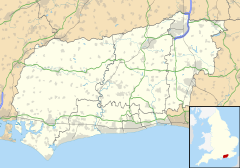Balcombe
| Balcombe | |
|---|---|
 Balcombe village centre |
|
| Balcombe shown within West Sussex | |
| Area | 21.05 km2 (8.13 sq mi) |
| Population | 1,765 2001 Census 1,917 (2011 Census) |
| • Density | 84/km2 (220/sq mi) |
| OS grid reference | TQ306302 |
| • London | 31 miles (50 km) N |
| Civil parish |
|
| District | |
| Shire county | |
| Region | |
| Country | England |
| Sovereign state | United Kingdom |
| Post town | HAYWARDS HEATH |
| Postcode district | RH17 |
| Dialling code | 01444 |
| Police | Sussex |
| Fire | West Sussex |
| Ambulance | South East Coast |
| EU Parliament | South East England |
| UK Parliament | |
| Website | Balcombe Village |
Balcombe is a village and civil parish in the Mid Sussex district of West Sussex, England. It lies 31 miles (50 km) south of London, 16 miles (26 km) north of Brighton, and 32 miles (51 km) east north east of the county town of Chichester. Nearby towns include Crawley to the north west and Haywards Heath to the south south east.
The name Balcombe may mean "Mining Place Camp". Bal is a Cornish word meaning a mining place as in Bal Maidens, and the same word may have existed in Ancient British Celtic. Although Coombe or Combe can mean a valley, it can also come from the Roman "camp". So possibly from its name Balcombe could have once been a Romano-British mining settlement.
South of Balcombe on the London to Brighton railway line is the Ouse Valley Viaduct. Designed and engineered by John Urpeth Rastrick (1780–1856) in consultation with the talented architect David Mocatta, it was completed in 1842. It is 100 feet (30 m) high and 500 yards long. It has 37 arches and was built with 11 million imported Dutch bricks.
The village has a series of murals about World War I in its Victory Hall. Lady Gertrude Denman commissioned artist Neville Lytton to paint the thirty-four feet (10 m) long by ten feet (3 m) high frescoes. The murals were featured on a television programme about the war in 2005.
Balcombe was the birthplace of Colour Sergeant (later Lieutenant Colonel) Frank Bourne DCM, who fought at the battle of Rorke's Drift in the Zulu War. He was the last British survivor of that battle when he died in Dorking in 1945. Famous residents included actor Paul Scofield.
...
Wikipedia

